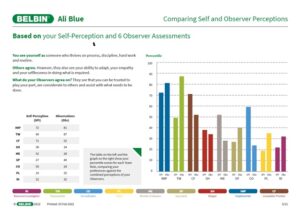
Understanding who we really are, as an individual, is a multi-faceted conundrum. It’s a big question, a huge question, with so many contributing aspects to consider.
We may seek to understand who we are on a personal level. Who are we as a parent, a son or daughter, a wife or husband, or as a friend? Beyond this, who are we at work? As a co-worker, manager or leader? What drives us in our career and how do we go about achieving our ambitions for the future? What are our overall core values and beliefs?
Clearly, the starting point for any journey of self-understanding, is with us, the individual concerned. This requires us to be open, honest and accurate in our assessment of ourselves. This is trickier than it might seem, as self-perception has its limitations.
Staying within the realms of our own (perhaps not overly challenging) self-perception is certainly easier but will not help us to grow and develop. Whilst the idea of asking for feedback can feel awkward or uncomfortable, understanding how others perceive our actions and behaviours is key to enhancing self-knowledge.
How might such a deeper understanding of ourselves, informed by feedback from others, help us? In the context of the workplace, understanding how we come across to others, how our behaviours affect teammates, and how we communicate with our direct reports or those we report to, enables us to adjust and modify our approach as appropriate.
Imagine if you knew how best to adapt your communication style depending on who you were talking with. Understanding the other person’s preferred working styles can ensure that information is exchanged more effectively.
How would it feel to have the confidence and knowledge to understand how best to apply yours and others’ strengths to build high-performing teams?

The Belbin Team Roles framework provides evidence-based practical advice and guidance enabling individuals to understand themselves and their strengths within a team. A Self-Perception Inventory (SPI) is used alongside Observer Assessments (OA) to provide individuals with a full picture of their behavioural styles at work enhancing self-awareness.
“To be authentic is to be the same person to others as you are to yourself. In part that entails paying attention to what others think of you, particularly people whose opinions you esteem and who will be candid in their feedback”. – Daniel Goleman, Harvard Business Review
Read the Case study: Belbin and Self-Awareness https://www.belbin.com/resources/belbin-case-studies/belbin-and-self-awareness-case-study
Watch the video: How to use Belbin reports to raise self-awareness and increase personal effectiveness: https://youtu.be/CmoUNv9os5s
Attend the next Practical Belbin Workshop on 14th September 2023 in London (face to face event): https://www.belbin.com/belbin-training/a-practical-day-of-belbin
Belbin is a TCD Trusted Provider. Belbin is an online profiling tool that translates an individual’s unique combination of strengths into Team Role contributions. Based on decades of research and incorporating feedback from the whole team, the Belbin reports offer actionable solutions and advice to boost individual and team performance, improve dynamics and address conflict.
Using the language of Belbin helps people to understand which behavioural contribution is required, and when. In other words, Belbin enables managers and teams to work together and communicate openly and effectively, building trust and psychological safety and defusing conflict, even when teams are not co-located.